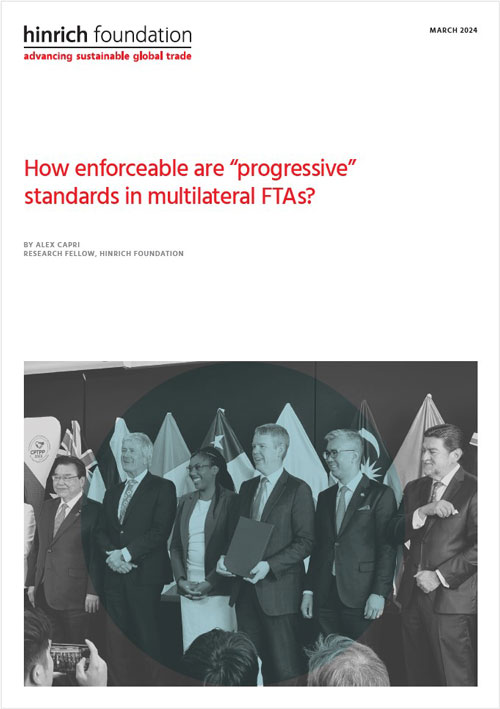Published 12 March 2024
The rapid surge of regional, sector-specific, and bilateral agreements globally reflects the increasing importance of geoeconomic factors in shaping countries' trade relations. Without proper mechanisms for achieving heightened transparency and traceability in global value chains, enforcing elevated standards proposed by these FTAs will be impractical for most participants.
Since the United States pulled out of the original Trans-Pacific Partnership in 2017, the resulting power vacuum has enabled China to pursue entry into the renewed Comprehensive and Progressive Trans-Pacific Partnership (CPTPP), despite the apparent incompatibilities of its unique economic model with core CPTPP values. Beijing’s strategic move not only reflects realpolitik, but also raises important existential questions about the feasibility of progressive FTAs – often characterized by their staunch promotion of environmental sustainability, ethical labor practices, and economic inclusivity.
For one, notable differences in the institutional effectiveness of member countries within a mega-FTA such as the CPTPP calls into question the efficacy of such agreements when their provisions are merely 'encouraged' and lack enforceability mechanisms. Even with such mechanism in place, the monitoring, measuring, and management of ambitious standards could prove to be exceedingly challenging. Moreover, geopolitical rivalry further complicates the implementation of progressive trade rules within larger frameworks, as it bifurcates strategic supply chains and fragments the trade landscape.
These factors would send countries running even faster to form their own smaller, more specialized trading arrangements with like-minded partners, writes Research Fellow Alex Capri in this paper. Whether these new FTAs achieve desired outcomes remains to be seen, but this trend is likely to persist in the coming years.
© The Hinrich Foundation. See our website Terms and conditions for our copyright and reprint policy. All statements of fact and the views, conclusions and recommendations expressed in this publication are the sole responsibility of the author(s).







